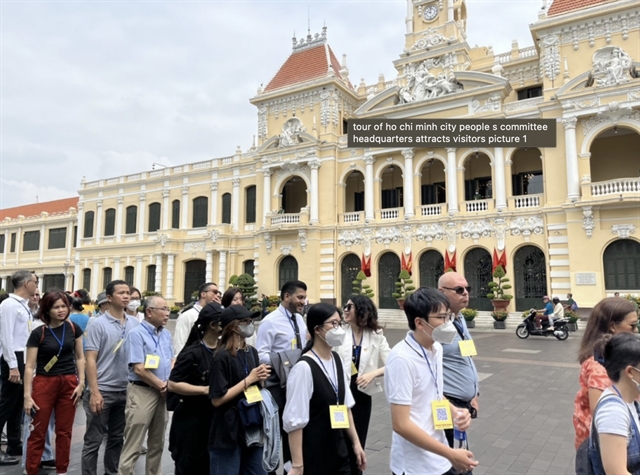The headquarters of the People’s Committee and People’s Council of HCM City has recently attracted a huge number of local and foreign visitors since the city government opened tours for tourists and locals.

The tour of HCM City's People's Committee headquarters attracts many local visitors and foreign tourists. — VNA/VNS Photo
HCM CITY — The headquarters of the People’s Committee and People’s Council of HCM City has recently attracted a huge number of local and foreign visitors since the city government opened tours for tourists and locals.
According to the southern city’s Department of Tourism, as of October 1, the tour has welcomed nearly 5,000 domestic and international visitors.
The number of foreign holidaymakers keen on the programme has steadily increased, the department added.
From now to December, visitors will not only have the chance to explore the building and be given information about the history, architectural highlights, and function of the building, but they will be able to visit several exhibitions featuring beautiful landscapes.
In addition, the exhibit will showcase the friendliness of local people through unique images.
Local people and visitors will be able to register for a trip to visit the 114-year-old national architectural and artistic building, at travel agents, the website www.visithcmc.vn, or by scanning the QR code.
The building was first opened to visitors this year during the National Reunification (April 30) and May Day (May 1) holidays, and attracted 1,500 people, who could only previously admire it from outside.
Visitors can see the main lobby, international reception room on the ground floor, second floor, a meeting room, the balcony and the architectural highlights, artistic design and functionality of the complex during an hour-long tour.
The tour aims to showcase a friendly and open image of the city and its history.
Located at 86 Lê Thánh Tôn Street in District 1, the People's Committee and People’s Council building was built in 1909 based on designs by French architect Femand Gardès modeled on bell towers in northern France.
The headquarters of the People’s Committee of HCM City, previously known as the HCM City Hall or “L'Hôtel de Ville”, is one of the oldest major buildings in the southern metropolis.
Sculptor Louis-Lucien Ruffier was in charge of the exterior architecture. — VNS